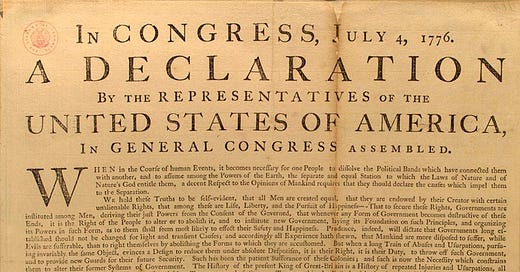Rise of a New Faith: The Challenge of Modernity
Every existing faith tradition arose prior to the Industrial Age and spread using language and metaphor relevant to a pre-Industrial population. Wokeism speaks the language of modernity.
The American Spirit Essays #17
(Previous: The Utopian Spirit)
Religions & Ideologies
This essay shifts our focus from America’s spiritual vacuum to the new faith that has arisen to fill it. Wokeism is a brilliant and dangerous response to the denialism of America’s spiritually starved elite. Wokeism fills gaps in their lives using language and metaphor to which they can relate—allowing them to meet unarticulated spiritual needs without ever forcing them to concede the existence of those needs.
As we discussed in the previous essay, America’s spiritual crisis leveled the playing field between two intentionally incomplete moral codes: The Biblically based spiritual platform of the Declaration of Independence and the anti-biblical ethics of utopianism. America’s legal development, however, has handed the utopian code an unfair advantage. The ancient traditions and ideas necessary to complete the American civic religion are widely and correctly recognized as religious. The newfound ideas emerging to complete the utopian code are widely and mistakenly viewed as secular. In the legal constructs delineating the rules of the American public square, secular viewpoints, symbols, and celebrations are welcome; their religious counterparts are not.
Constitutional law prohibits the establishment of an official religion. It is silent on the establishment of an official ideology. It provides no clarity, however, on where one begins and the other ends. One critical goal of this essay series is a demonstration that Wokeism is not only a religion, but that it is quickly moving towards becoming the established religion of the United States. By the time we’re done, I’m hoping to have laid the groundwork for a series of Court challenges that render it impossible to teach Wokeism as “truth” in public schools or any other American public institution.
Utopians have seized upon that legal advantage. They don’t call their constellation of metaphysical beliefs a religion or a faith. They deny emphatically that their clearly metaphysical beliefs are metaphysical. Yet the system they are crafting is just as all-encompassing as was every one of the world’s majority faiths until the European Counterreformation ended in a stalemate. Their system espouses clear and distinctive views of economics, commerce, sexuality, community, behavior, and belief. It produces heroes, villains, martyrs, shrines, chants, holidays, and rituals. It polices blasphemy and dictates righteousness of thought. It grounds its sense of justice in sources it deems True. It has well-defined views of repentance, redemption, humanity’s role in the universe, and the end of times. It has embraced rituals and religious garb. Though nearly all adherents will deny it, many of its most controversial and unique assertions make far more sense in the spiritual realm than they do in the realm of objectively observable reality. To suggest that such a comprehensive system is anything other than a religion is to demonstrate ignorance of the nature of religion.
Keep reading with a 7-day free trial
Subscribe to American Restoration by Bruce D. Abramson to keep reading this post and get 7 days of free access to the full post archives.



